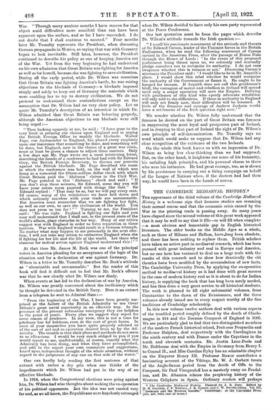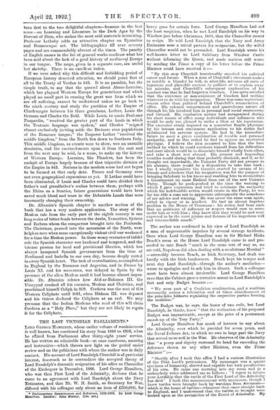TILE CAMBRIDGE MEDIAEVAL HISTORY.*
Tree appearance of the third volume of the Cambridge Mediaeval History is a welcome sign that humane studies are resuming their normal course and that the economic crisis caused by the War in the printing trade is passing away. So many years have elapsed since the-second volume of this great work appeared that it may be well to say that it fills—or will fill when complete —a most obvious and lamentable gap in English historical literature. The older books on the Middle Ages as a whole, such as those of Milman and Hallam, have.long been obsolete, and there has been nothing to replace them. British scholars have taken an active part in mediaeval research, which has been pursued with great industry and zeal in Europe and America, but no one here has ventured to deal on a largo scale with the results of this research and to show how drastically the old theories, have been modified by the accumulation of new facts. The Cambridge University Press, by applying the co-operative method to mediaeval history as it had done with great success in the ease of modern history and as it is about to do for Indian history, is supplying the book that has long been sorely needed, and has thus done a very great service to all historical students. The work is. planned to fill eight substantial volumes, from Constantine to the dawn of the Renaissance, and the three volumes already issued are in every respect worthy of the fine traditions of Cambridge scholarship.
In this new volume twelve authors deal with various aspects of the troubled period roughly defined by the death of Charle- magne in 814 and the Norman Conquest of England in 1060. We are particularly glad to find that two distinguished members of the modern French historical school, Professor Poupardin and Professor Halphen, deal respectively with the Carolingians in the ninth century and with France under the Capetian in the tenth and eleventh centuries. Mr. Austin Lane-Poole and Mr. Holthouse deal with the Empire in Germany from Henry L to Conrad IL, and Arms Caroline Ryley has an admirable chapter on the Emperor Henry Di. Professor Mawer contributes fascinating account of the Vikings, Mr. W. J. Corbett treats of the Anglo-Saxon period from the death of Offa to the Conquest, Sir Paul Vinogradoff has a masterly essay on Feudal- ism, and Dr. Altamira relates, the perplexing history of the Western Caliphate in Spain. Ordinary readers will perhaps • The Cambridge Mediaeval History. Planned by J. B. Bury. Edited law H. M. Gwatkin, J. P. Whitney, J. B. Tanner, and C. W. PrevItk-Orton. Vol. M.
Germany and the Western lannire." Cambridge : at the UnlYenag Press. [50s. net, with case of ream!
turn first to the two delightful chapters—humane in the best sense—on Learning and Literature in the Dark Ages by the Provost 'of Eton, who makes the most arid materials interesting. Professor Lethaby adds an attractive chapter on Byzantine and Romanesque art. The bibliographies fill over seventy pages and are commendably abreast of the times. The paucity of English names in the list of general works confirms what has been mid about the lack of a good history of mediaeval Europe in our tongue. The maps, given in a separate case, are useful but sketchy. There is an excellent index.
If we were asked why this difficult and forbidding period of European history deserved attention, we should point first of all to the Treaty of Verdun in 843. It is no paradox, but the simple truth, to say that the quarrel about Alsace-Lorraine, which has plagued Western Europe for generations and which played no small part in causing the great war from which we are all suffering, cannot be understood unless we go back to the ninth century and study the partition of the Empire of Charlemagne between his three grandsons, Lothar, Louis the German and Charles the Bald. While Louis, to quote Professor Poupardin, " received the greater part of the lands in which the Teutonic language was spoken," and Charles " reigned almost exclusively (setting aside the Bretons) over populations of the Romance tongue," the Emperor Lothar "received the middle kingdom," from the North Sea down to Southern Italy. This middle kingdom, as events were to show, was an unstable dominion, and the encroachments upon it from the east and from the west may be said, in a sense, to make up the history of Western Europe. Lorraine, like Flanders, has been the cockpit of Europe largely because of that tripartite division of the Empire in 843. Nations in the modern sense had not begun to be formed at that early date. France and Germany were not even geographical expressions as yet. If Lothar could have been eliminated, if Louis and Charles eould have divided their father's and grandfather's realms between them, perhaps with the Rhine as a frontier, future generations would have been saved much blood and tears in the Debatable Lands that were incessantly changing their ownership.
Dr. Altamira's Spanish chapter is another section of the book that has a very modern application. The story of the Moslem rule from the early part of the eighth century is one long series of bitter feuds between the Arabs, Yemenites, Syrians and Berbers whom the conquerors brought into the Peninsula. The Christians, penned into the mountains of the North, were helpless save when some exceptionally violent civil war weakened for a time the Moslem power. In those weary centuries of infidel rule the Spanish character was hardened and tempered, and the intense passion for local and provisional liberties, which has always hampered Spanish governments from the time of Ferdinand and Isabella to our own day, became deeply rooted in every Spanish heart. The task of centralization, accomplished in England by the Normans and Angevin, and in France by Louis N.I. and his successors, was delayed in Spain by the presence of the alien Moslem until it had become almost impos- sible. Dr. Altataira relates how Abd-ar-Rahman ILL the Umayyad crushed all his enemies, -Moslem and Christian, and proclaimed himself Caliph in 929. Cordova was the seat of this Western Caliphate until 1031, when Hisham M. was deposed and his viziers declared the Caliphate at an end. We may presume that the Indian Moslems who read of this wlil claim Cordova as a " Holy Place," but they are not likely to regain it for the Caliphate.



































 Previous page
Previous page